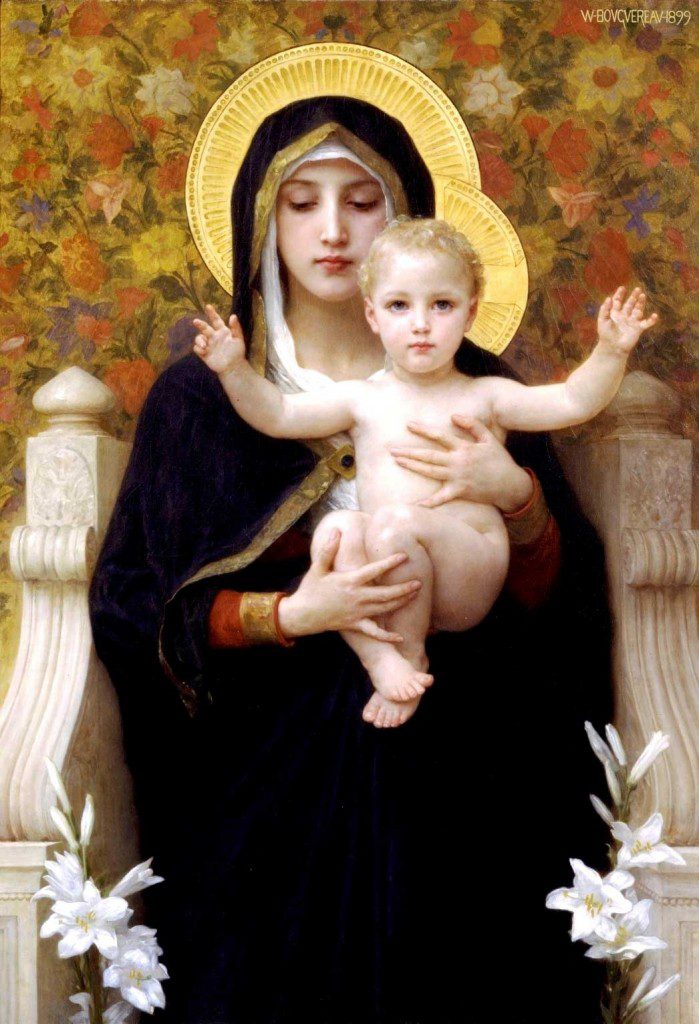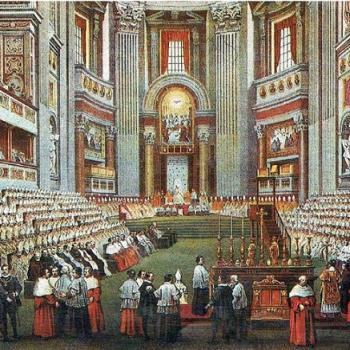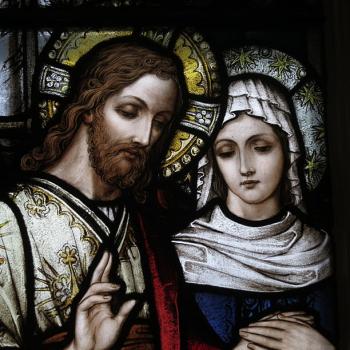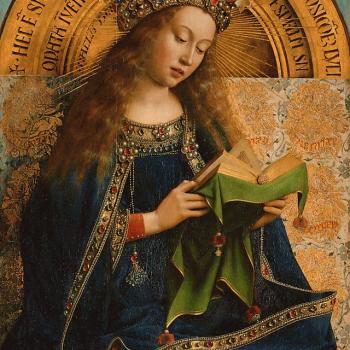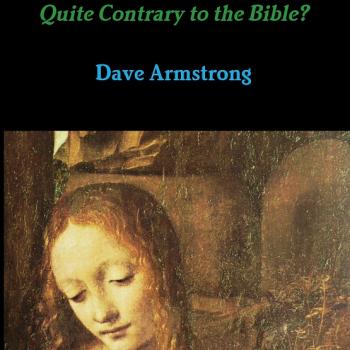(vs. John Cranman)
This is literally vacuous.
Catholics think in terms of “both/and” rather than making false and unnecessary dichotomies (“either/or”). This is also the Hebrew and biblical outlook.
The best way to honor Jesus is to simply do what He says. If we are talking about a hierarchy of ways to honor Christ, I can imagine that living out the Great Commission is way further up there than honoring Mary. So obviously, honoring Mary isn’t the “best” way to honor Christ.
You’re still thinking in either/or terms. There is no necessity to do that. Doing Jesus’ will honors Jesus; so does honoring His mother, which (as it says above) is always intended as primarily honor and glory to the Son, Who made His very mother, as He willed.
Okay; is honoring Mary the primary way to honor Christ, or is it not? Because, the former is what this meme is claiming.
No it’s not. It’s saying it is up at the top of honoring Jesus, without ruling out other ways of doing that. Both/and. Honoring His mother is honoring Him, in Catholic / biblical both/and thinking. The problem in Protestant thinking (esp. Reformed) is persistent false dichotomies. It can’t comprehend honor of anyone besides God, as if such honor detracts from His honor and is necessarily idolatry. Catholics recognize distinctions between adoration and veneration, and also follow the notion of worshiping God through His creation. Thus, Paul writes:
Romans 1:20 (RSV) Ever since the creation of the world his invisible nature, namely, his eternal power and deity, has been clearly perceived in the things that have been made. . . .
Analogously, we can say, “Jesus’ eternal power and deity, has been clearly perceived in the things [in this instance, Mary] that have been made.” That’s both/and thinking.
Dave, this is just sophistry then. Why not just speak plainly here? It doesn’t say that it’s “up at the top”. It says that “we never give more honor” than when we honor Mary. I would even argue that it’s nowhere near required, nor at the top.
You have to see it as “sophistry” because you are restricted by your own false premises (either/or thinking). I am speaking plainly (and biblically and logically and apostolically). But to you it is sophistry because you don’t yet comprehend the biblical both/and outlook. You are too beholden to the traditions of men (either/or dichotomies).
Stating “we never give more honor” is not saying that it is the highest or only form of honoring Christ; only that no other form could give more honor. Technically, then, one could also say, in line with the meme, that “we never give more honor to Christ than simply do what He says.” They could both be on the highest level. And indeed they are!
Moreover, the saint makes the following equation: “we honour her simply and solely to honour him.” But there’s your “both/and” outlook again, which Protestants rarely can conceptualize, because they’ve relentlessly been taught either/or thinking in their own circles. Thus, they see it as “sophistry” or (also commonly) “idolatry”.
These aren’t false premises. It has to do with clear communication. The meme communicates an idea. Now if the meme doesn’t actually mean what it says, then it’s communicating in a very unclear way. That’s sort of what sophistry means. Clear communication has nothing to do with the “traditions of men”. It has to do with language and passing along ideas.
And what do you mean here?: “Stating “we never give more honor” is not saying that it is the highest or only form of honoring Christ; only that no other form could give more honor.” If honoring Mary is the maximal way to honor God, then it logically follows that honoring Mary is the highest way to honor God. But I can’t tell whether you are admitting that, or denying it. What you’re saying isn’t clear.
I’m saying that it is the highest, and so are many other things we can do, as you note. It’s the “highest” without excluding other “highests.” Both / and . . . And it is the same as honoring Jesus Christ our Lord, as the meme says: “we honour her simply and solely to honour him.”
That’s what you can’t grasp, because you don’t see that we can adore God through creatures (and even things) that he has made. Protestantism, for the most part. has no category for that. It’s worship God, and no honor or veneration for anyone else, or secondarily venerating them, through which we are primarily adoring God.
Also it’s not. Honoring Mary is not the maximal, or highest way we can honor God. That’s such nonsense. It’s not even anywhere near the top. Dying for Christ, for example, is a much higher way to honor God. Maybe even the ultimate way, as there is nothing greater one can give than to lay down his/her life.
And Jesus nowhere tells us we are obligated to show this ongoing devotion and honor towards Mary. He always points our spiritual devotion towards God, not multiplied entities.
Jesus may not have, but there are a lot of Christian elements He didn’t talk about at all, or not explicitly: that come primarily from the epistles. The biblical motif of imitating holy people is similar to veneration (see: Rom 11:14; 1 Cor 4:15-16; 11:1-2; Phil 3:17; 4:9; 1 Thess 1:6-7; 2:9-14; 3:7-9; 1 Tim 4:12; 2 Tim 3:10-14; Heb 6:12; 13:7; Jas 5:10-11; 1 Pet 3:1-2; 5:2-3).
Paul makes it clear more than once that imitating him is in complete harmony with the notion of imitating Christ, whom Paul is imitating (see, e.g., Ephesians 5:1: “Therefore be imitators of God, as beloved children:): “Be imitators of me, as I am of Christ” (1 Cor 11:1); “And you became imitators of us and of the Lord . . .” (1 Thess 1:6). It’s not either/or.
By analogy, it is altogether proper to venerate and honor saints, who have more perfectly attained God’s likeness (Matt 22:30; 1 Cor 13:9-12; 2 Cor 3:18; Phil 3:21; Heb 11:40; 1 Jn 3:2; Rev 21:27; 22:14), in light of the example of how “heroes of the faith” are regarded (Hebrews 11) and also the biblical injunctions to honor all sorts of people:
Romans 12:10 love one another with brotherly affection; outdo one another in showing honor. (cf. 1 Cor 12:23-26)
Romans 13:6-7 For the same reason you also pay taxes, for the authorities are ministers of God, attending to this very thing. Pay all of them their dues, taxes to whom taxes are due, revenue to whom revenue is due, respect to whom respect is due, honor to whom honor is due.
Ephesians 6:2 “Honor your father and mother” (this is the first commandment with a promise), (cf. Ex 20:12; Deut 5:16)
1 Timothy 5:3 Honor widows who are real widows.
1 Timothy 5:17 Let the elders who rule well be considered worthy of double honor, especially those who labor in preaching and teaching;
1 Peter 2:17 Honor all men. Love the brotherhood. Fear God. Honor the emperor.
1 Peter 3:7 Likewise you husbands, live considerately with your wives, bestowing honor on the woman . . . (cf. Gen 30:20)
King Asa was honored after his death:
2 Chronicles 16:14 They buried him in the tomb which he had hewn out for himself in the city of David. They laid him on a bier which had been filled with various kinds of spices prepared by the perfumer’s art; and they made a very great fire in his honor. (cf. 21:19, showing that this was a general practice)
King Hezekiah was also so honored:
2 Chronicles 32:33 And Hezeki’ah slept with his fathers, and they buried him in the ascent of the tombs of the sons of David; and all Judah and the inhabitants of Jerusalem did him honor at his death.
Only Catholicism tells us otherwise, through its own interpretive liberties. And not everyone agrees with those liberties. So if I’m seeing things through “Protestant” lenses, then likewise you, through Catholic ones.
There are many more examples in the Bible of veneration of both men and angels (often as direct representatives of God):
Genesis 18:1-4, 22 And the LORD appeared to him by the oaks of Mamre, as he sat at the door of his tent in the heat of the day. [2] He lifted up his eyes and looked, and behold, three men stood in front of him. When he saw them, he ran from the tent door to meet them, and bowed himself [shachah] to the earth, [3] and said, “My lord, if I have found favor in your sight, do not pass by your servant. [4] Let a little water be brought, and wash your feet, and rest yourselves under the tree, . . . [22] So the men turned from there, and went toward Sodom; but Abraham still stood before the LORD.
The text in-between goes back and forth, referring to “men” or “they” or “them” (18:9, 16) and “The LORD” or first-person address from God (18:10, 13-14, 17-21) interchangeably, for the same phenomenon and personal / physical / verbal encounter.
Joshua 5:13-15 When Joshua was by Jericho, he lifted up his eyes and looked, and behold, a man stood before him with his drawn sword in his hand; and Joshua went to him and said to him, “Are you for us, or for our adversaries?” [14] And he said, “No; but as commander of the army of the LORD I have now come.” And Joshua fell on his face to the earth, and worshiped [shachah], and said to him, “What does my lord bid his servant?” [15] And the commander of the LORD’s army said to Joshua, “Put off your shoes from your feet; for the place where you stand is holy.” And Joshua did so.
A “man” is equated with God also in Genesis 32:24, 30. The Angel of the Lord is sometimes referred to as God Himself, but not always; and is venerated. So. for example:
Judges 13:15-22 Mano’ah said to the angel of the LORD, “Pray, let us detain you, and prepare a kid for you.” [16] And the angel of the LORD said to Mano’ah, “If you detain me, I will not eat of your food; but if you make ready a burnt offering, then offer it to the LORD.” (For Mano’ah did not know that he was the angel of the LORD.) [17] And Mano’ah said to the angel of the LORD, “What is your name, so that, when your words come true, we may honor you?” [18] And the angel of the LORD said to him, “Why do you ask my name, seeing it is wonderful?” [19] So Mano’ah took the kid with the cereal offering, and offered it upon the rock to the LORD, to him who works wonders. [20] And when the flame went up toward heaven from the altar, the angel of the LORD ascended in the flame of the altar while Mano’ah and his wife looked on; and they fell on their faces to the ground. [21] The angel of the LORD appeared no more to Mano’ah and to his wife. Then Mano’ah knew that he was the angel of the LORD. [22] And Mano’ah said to his wife, “We shall surely die, for we have seen God.” (cf. 6:12-16, 20-23)
This passage is remarkable in that it goes back and forth between God (13:16, 19, 22) and the angel of the Lord (or of God) as His direct representative (13:15-18, 20-21 and in the larger passage, 13:3, 6, 9, 13). The angel is honored (v. 17), they fall on their faces to worship (v. 20) and at length the angel is equated with God as His visible manifestation (v. 22). But the difference between the angel and God is highlighted by the angel being described as a “man of God” (13:6, 8) and “the man” (13:10-11).
The angel of the Lord is also equated with God (theophany) in Gen 31:11-13; Jud 2:1; but differentiated from God as well, as a representative: (2 Sam 24:16; 1 Ki 19:6-7; 2 Ki 19:35; Dan 3:25, 28; 6:23; Zech 1:8-14).
The Bible, in summary, is quite clear: there is an occasional use of angels or men as direct representatives of God, and they are “worshiped” [i.e., venerated] only insofar as they represent God, as a visual image or object, through whom God is working and communicating. But veneration is strictly separated from the adoration due to God alone (see: Acts 10:25-26; Rom 1:25; Col 2:18; Rev 22:8-9). Everything has to be considered together, as a whole.
All of this explicit biblical evidence is precisely in line with what the Catholic Church teaches. It is the outright prohibition of all veneration and honor of creatures whatever in most forms of Protestantism that is a grossly unbiblical notion.
Moreover, “worship” is used in a wider (literary) sense of showing reverence or obeisance to men of authority (in this instance, a king), in 1 Chronicles 29:20: “And David said to all the congregation, Now bless the LORD your God. And all the congregation blessed the LORD God of their fathers, and bowed down their heads, and worshipped [shachah] the LORD, and the king” (KJV). RSV has: “worshiped the LORD, and did obeisance to the king,” but it is one Hebrew word applied to both.
Much of what you point out here in scripture is not at all incompatible with my position. Of course we honor people, and even imitate their example. Of course I’d fearfully honor an angel if one were before me.
But that’s worlds apart from offering my ongoing spiritual devotion towards any of the above, or singing psalms and praises to them in some ongoing fashion.
Well, John, we Catholics read the same Bible you read, that says “honor all men” — so we think that the Mother of our Lord Jesus Christ, Who was God, is worthy of great honor: above all other creatures. Martin Luther very much thought so, too. It’s not just a Catholic thing. He wrote:
The “great things” are nothing less than that she became the Mother of God, in which work so many and such great good things are bestowed on her as pass man’s understanding. For on this there follows all honor, all blessedness, and her unique place in the whole of mankind, among which she has no equal, namely, that she had a child by the Father in heaven, and such a Child. She herself is unable to find a name for this work, it is too exceeding great; all she can do is break out in the fervent cry, are great things, impossible to describe or define. Hence men have crowded all her glory into a single word, calling her the Mother of God. No one can say anything greater of her or to her, though he had as many tongues as there are leaves on the trees, or grass in the fields, or stars in the sky, or sand by the sea. (The Magnificat, June 1521; tr. A. T. W. Steinhaeuser)
[P]raise and thank God through Mary and the grace given her. Laud and love her . . . Similarly, our prayer should include the Mother of God as we say: O God, what a noble person you have created in her! May she be blessed! And so on. And you who honored her so highly, grant also to me . . . (Personal Prayer Book, 1522, tr. Martin H. Bertram; in LW, v. 43)
We do not want to take away from Mary any honor which is her due. . . . let the Blessed Virgin keep her place of honor. Among all the women of the world she has this privilege from God, that as a virgin she gave birth to the Son of God. (Lectures on Genesis, Chapters 1-5, Feb. 1536, ed. Jaroslav Pelikan, tr. George V. Schick; in LW, v. 1)
* * * * *


